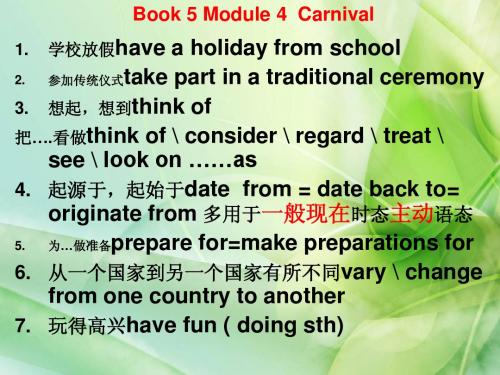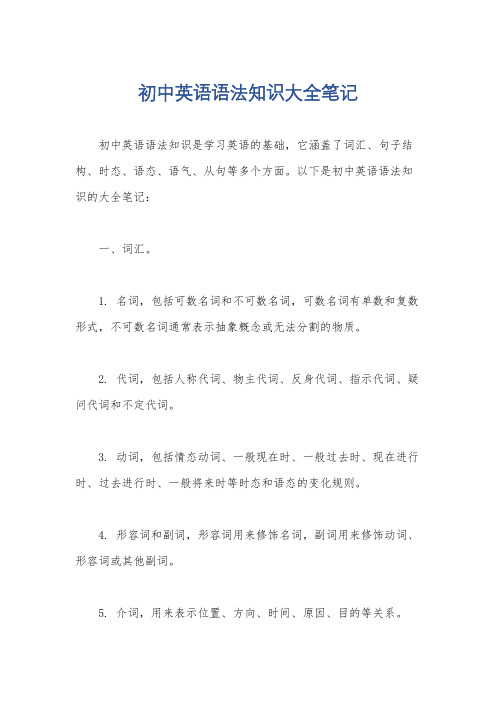基础英语笔记5.4
- 格式:doc
- 大小:65.50 KB
- 文档页数:12

第一部分:概述1.1 主题介绍在七年级上册英语学习中,第五单元是一个非常重要的部分。
在这个单元中,学生将学习到一些基础的英语单词,这些单词将会在他们的学习生涯中扮演重要的角色。
在本文中,我将共享一些关于第五单元的英语单词笔记,希望能够帮助学生更好地掌握这些单词。
1.2 目的我撰写这篇文章的目的是帮助七年级上册英语学生更好地理解并记忆第五单元的英语单词,从而提高他们的英语水平。
1.3 结构本文将分为四个部分,分别是基础单词、动词、形容词和其他相关单词。
每个部分将包括一些重要的单词,并附上它们的中文释义和例句,以便读者更好地理解和记忆。
第二部分:基础单词2.1 apple中文释义:苹果例句:I like to eat an apple every day. 2.2 book中文释义:书例句:This is my favorite book.2.3 cat中文释义:猫例句:The cat is sleeping on the ch本人r.2.4 dog中文释义:狗例句:I have a pet dog at home.第三部分:动词3.1 play中文释义:玩,玩耍例句:I like to play basketball with my friends.3.2 run中文释义:跑例句:The boy can run very fast.3.3 jump中文释义:跳跃例句:The rabbit can jump high.3.4 swim中文释义:游泳例句:I can swim in the pool.第四部分:形容词4.1 happy中文释义:快乐的例句:I am very happy today.4.2 sad中文释义:伤心的例句:She is feeling sad because she lost her toy.4.3 small中文释义:小的例句:The baby has a small toy.4.4 big中文释义:大的例句:My school bag is big and heavy. 第五部分:其他相关单词5.1 like中文释义:喜欢例句:I like to eat chocolate.5.2 dislike中文释义:不喜欢例句:I dislike the taste of onions. 5.3 color中文释义:颜色例句:My favorite color is blue.5.4 family中文释义:家庭例句:I live with my family in the city.第六部分:总结通过这篇文章,我希望读者能够更好地掌握七年级上册英语单词笔记第五单元中的一些基础单词、动词、形容词以及其他相关单词。


初中英语语法知识大全笔记初中英语语法知识是学习英语的基础,它涵盖了词汇、句子结构、时态、语态、语气、从句等多个方面。
以下是初中英语语法知识的大全笔记:一、词汇。
1. 名词,包括可数名词和不可数名词,可数名词有单数和复数形式,不可数名词通常表示抽象概念或无法分割的物质。
2. 代词,包括人称代词、物主代词、反身代词、指示代词、疑问代词和不定代词。
3. 动词,包括情态动词、一般现在时、一般过去时、现在进行时、过去进行时、一般将来时等时态和语态的变化规则。
4. 形容词和副词,形容词用来修饰名词,副词用来修饰动词、形容词或其他副词。
5. 介词,用来表示位置、方向、时间、原因、目的等关系。
6. 连词,包括并列连词、从属连词和关系代词。
二、句子结构。
1. 主谓宾结构,句子的基本结构,主语+谓语+宾语。
2. 主谓补结构,谓语动词后接表语或宾补,用来补充说明主语或宾语。
3. 主谓双宾结构,谓语动词后接两个宾语,分别表示人和物。
4. 主系表结构,谓语动词为系动词,后接表语。
5. 复合句,包括并列句、主从复合句和状语从句等多种类型。
三、时态。
1. 一般现在时,表示经常性或习惯性的动作或状态。
2. 一般过去时,表示过去某个时间发生的动作或状态。
3. 一般将来时,表示将来某个时间将要发生的动作或状态。
4. 现在进行时,表示现在正在进行的动作。
5. 过去进行时,表示过去某一时刻正在进行的动作。
6. 现在完成时,表示过去某个时间开始,一直持续到现在的动作或状态。
四、语态。
1. 主动语态,表示主语是动作的执行者。
2. 被动语态,表示主语是动作的承受者。
五、语气。
1. 陈述句,陈述一个事实或看法。
2. 祈使句,表示请求、命令、建议等。
3. 疑问句,用来询问信息或确认事实。
六、从句。
1. 定语从句,用来修饰名词或代词。
2. 状语从句,用来修饰动词、形容词或副词。
3. 名词性从句,在句子中充当名词的成分。
以上就是初中英语语法知识的大全笔记,希望对你的学习有所帮助。

英语┃第5课学习笔记4再练习读一个句子:Pinhurst is only five miles from Silbury,这一句很长,我们还是分成一小段一小段地读。
1、Pinhurst is onlyPinhurst要注意r字母的儿化,这个字分成两部分读,Pinhurs放在一起读,hurs读似上声,最后一个字母t和is的i连读,且浊化读似“敌”音。
only/'onlɪ/,o发本音,/lɪ/的发意要注意,不要发成“义”。
2、five miles from Silburymiles,要注意l的发音,似“偶”。
from,儿化,弱读。
Silbury,升调。
but Mr. Scott cannot get a telephone for his new garage,1、but Mr. Scott cannot get a telephonebut有两个读音/bʌt,bət/,这里读第二个,t不发音。
Mr. 要儿化。
cannot是一个单词,不要看成can not两个字。
get a 连读,且有点浊化如/ðə/。
telephone,升调。
2、for his new garagegarage的发音不同前面的“上声“,似“去声”。
so he has just bought twelve pigeons.1、so he has just bought在第4课最后一句也有so he…,那里的he重读,这里没那么重读。
bought的t不发音。
2、twelve pigeons.要注意twelve中l的发音。
pigeons.重读,并注意i的发音。

《七年级上册英语4,5单元知识点总结》一、动词时态1. 一般现在时:表示经常性或习惯性的动作2. 现在进行时:表示正在进行的动作3. 一般过去时:表示过去发生的动作4. 现在完成时:表示过去发生的动作对现在产生的影响二、名词的单复数1. 可数名词:可以用数词或量词计数的名词2. 不可数名词:不能用数词或量词计数的名词3. 名词的复数形式:一般在词尾加-s或-es三、形容词和副词1. 形容词:修饰名词或代词,用来描述人或事物的特征2. 副词:修饰动词、形容词和其他副词,用来表示时间、地点、原因等四、情态动词1. can/could:表示能力或许可性2. may/might:表示可能性或许可性3. must:表示肯定、必须、推测等五、连词和介词1. 连词:连接词、短语、从句等,如and, but, because等2. 介词:用来表示名词与其他词语之间的关系,如in, on, at等六、阅读理解1. 排列顺序题:根据文章内容,将句子、图片或段落进行正确的排列顺序2. 选择题:根据文章内容选择正确的答案3. 判断题:判断给出的题目与文章内容是否相符4. 填空题:根据文章内容填写正确的单词或短语七、作文写作1. 书面表达:根据给定的题目或内容,进行书面表达2. 句型转换:根据要求,进行句子结构的转换3. 段落填空:根据文章内容,选择正确的段落填入空白处七年级上册英语4,5单元涉及了英语学习的基础知识和语言运用能力。
通过掌握动词时态、名词的单复数、形容词和副词、情态动词、连词和介词等知识点,学生能够更加准确地表达自己的意思。
阅读理解和作文写作能培养学生的阅读能力和写作能力,帮助他们更好地理解和运用所学知识。
在我的个人观点和理解中,这些知识点不仅是英语学习的基础,更是日常交流和表达的基础。
掌握了这些知识点,可以让学生在学习和生活中更加自如地运用英语,提高沟通能力和语言表达能力。
希望通过本篇文章,你能够更加深入地理解七年级上册英语4,5单元的知识点,并在学习中更加灵活地运用这些知识,提高自己的英语水平。

人教版新课标小学英语笔记人教版新课标小学英语教材注重培养学生的英语听说读写能力,以及跨文化交际能力。
以下是一些重要的学习笔记,帮助学生更好地掌握教材内容。
1. 词汇积累:英语学习的基础是词汇,学生应该每天记忆一定数量的单词,并尝试在日常生活中使用这些单词。
2. 语法理解:语法是语言的框架,学生需要理解并掌握基本的语法规则,如时态、语态、句型结构等。
3. 听力训练:通过听英语歌曲、故事、对话等,提高学生的听力理解能力。
同时,注意模仿发音和语调。
4. 口语练习:积极参与课堂讨论,与同学进行角色扮演,提高口语表达能力。
5. 阅读理解:阅读英语文章、故事书,理解文章大意,识别关键词和短语。
6. 写作技巧:练习写日记、小故事或书信,注意句子结构和拼写。
7. 文化意识:了解英语国家的文化背景,增加对英语语言的理解和兴趣。
8. 学习策略:制定学习计划,合理安排学习时间,使用记忆技巧,如联想记忆、分类记忆等。
9. 课堂参与:积极参与课堂活动,如小组讨论、角色扮演、游戏等,以提高学习兴趣和效果。
10. 自我评估:定期进行自我测试,评估学习进度,及时调整学习方法。
11. 家庭作业:认真完成家庭作业,这是巩固课堂学习内容的重要环节。
12. 课外阅读:阅读适合自己水平的英语课外书籍,增加语言输入,提高语言水平。
13. 多媒体学习:利用网络资源、教育软件等多媒体工具辅助学习。
14. 同伴互助:与同学互相帮助,共同讨论学习问题,提高学习效率。
15. 教师指导:积极向老师请教,及时解决学习中遇到的问题。
通过这些学习笔记,学生可以系统地学习英语,逐步提高英语水平。
同时,家长和老师也应该鼓励学生,为他们创造一个积极的学习环境。
初中英语笔记精华初中英语学习是为未来英语能力打下坚实基础的重要阶段。
在这个过程中,做好笔记是非常关键的。
一份好的英语笔记不仅能帮助我们复习知识点,还能加深对知识的理解和记忆。
以下是我为大家整理的初中英语笔记的精华内容。
一、词汇词汇是英语学习的基石。
在初中阶段,我们需要积累大量的基础词汇。
1、名词可数名词和不可数名词的区分。
例如,“apple”(苹果)是可数名词,“water”(水)是不可数名词。
名词的复数形式。
一般在词尾加“s”,但也有特殊情况,如“child”的复数是“children”,“man”的复数是“men”。
2、动词动词的时态。
初中阶段主要学习一般现在时、一般过去时、一般将来时、现在进行时和过去进行时。
要掌握不同时态的构成和用法。
动词的不规则变化。
例如,“go”的过去式是“went”,“eat”的过去式是“ate”。
3、形容词和副词形容词修饰名词,副词修饰动词、形容词和其他副词。
形容词和副词的比较级和最高级。
规则变化如在词尾加“er”“est”,不规则变化如“good”的比较级是“better”,最高级是“best”。
4、介词常见介词的用法,如“in”“on”“at”“for”“with”等。
介词短语的固定搭配,如“in the morning”(在早上),“on foot”(步行)。
二、语法语法是英语句子结构和规则的体现。
1、句子成分主语、谓语、宾语、定语、状语、补语的概念和作用。
例如,“I love English”中,“I”是主语,“love”是谓语,“English”是宾语。
2、简单句、复合句和并列句简单句的五种基本句型:主+谓;主+谓+宾;主+系+表;主+谓+双宾;主+谓+宾+宾补。
复合句包括宾语从句、定语从句和状语从句,要掌握引导词的用法和从句的语序。
并列句由并列连词连接,如“and”“but”“or”。
3、语态主动语态和被动语态的构成和转换。
例如,“The boy broke the window”(主动语态),“The window was broken by the boy”(被动语态)三、听力听力是英语学习中的重要技能。
第四单元知识点总结一、写出下列词的比较级和最高级形式:1. big_______ ________2. popular ___________ __________3.close _________ _________4.bad ______ _______5.far _________ __________fortable___________ __________7.new_______ _______8.cheaply _________ __________9.carefully__________ _________ 10.expensive_______ _______11.talented________ _______12.excited________ _________13.famous_________ _________二、重点短语:1.电影院_____________2.买票快____________________3.离……近________________4.最短的等待时间_______________ 5,.最舒服的座位____________________________ 6.最好的服装店________________________ 7.最好的电台_________________________ 8.选歌最仔细____________________9.欢迎到……___________________________10.到目前为止______________ 11.你认为……怎么样?__________________________?12.最新鲜的食物___________________13.在这儿附近_________________=__________ =______________________14.坐得最舒服_____________________________15.选秀节目/才艺展示_________________ 16.最有才的人________________________ 17.实在有才_______________ 18.变得越来越受欢迎__________________________19.全世界___________20.比如_____________21.有共同特征____________________ 22.寻找____________23.等等_____________24.各种各样的___________________25.弹钢琴弹得最好___________________ 26.唱歌唱得最动听______________________ 27.由……决定_________________ 28.发挥作用:有影响________________________ 29.得到丰厚的奖励_______________ 30.编造__________ 31.认真对待……____________ 32.给某人某物_______________33.实现_________34.可去的最好的地方______________35.最便宜地买到衣服_______________________三、重点句子:1.那个是最好的服装店?Which is __________ __________ __________ ___________?2.我是镇上新来的。
小学英语语法基础知识大全笔记一、名词(Nouns)名词是英语语法中的一类词性,用来表示人、事物、地点、概念等。
1. 可数名词(Countable Nouns)可数名词用来表示可以计数的事物,可以用定冠词(a/an)或数词(one, two, three, 等)修饰。
例句:I have a cat.(我有一只猫。
)2. 不可数名词(Uncountable Nouns)不可数名词用来表示不能被单独计数的事物,通常没有复数形式。
例句:I like milk.(我喜欢牛奶。
)3. 可数名词的复数形式可数名词的复数形式通常在词尾加 -s 或 -es。
例句:One cat, three cats.(一只猫,三只猫。
)二、代词(Pronouns)代词是用来替代名词的词语。
1. 人称代词(Personal Pronouns)人称代词用来表示人或事物的代称。
•主格人称代词:I, you, he, she, it, we, they(我,你,他,她,它,我们,他们)•宾格人称代词:me, you, him, her, it, us, them(我,你,他,她,它,我们,他们)例句:She is my friend. I like her.(她是我的朋友。
我喜欢她。
)2. 物主代词(Possessive Pronouns)物主代词用来表示所属关系。
•形容词性物主代词:my, your, his, her, its, our, their(我的,你的,他的,她的,它的,我们的,他们的)•名词性物主代词:mine, yours, his, hers, its, ours, theirs(我的,你的,他的,她的,它的,我们的,他们的)例句:This book is mine. Is this pen yours?(这本书是我的。
这支笔是你的吗?)3. 指示代词(Demonstrative Pronouns)指示代词用来指示人或事物的位置。
必修五英语笔记整理unit4journalist n. 新闻工作者,新闻记者;记日志者journal n. 日报,日志,日记;定期刊物,期刊,杂志;[会计]分类账involve vt. 包含;使参与,牵涉;围绕,缠绕;使专心于involvement n. 牵连,参与;加入;财政困难;牵连的事务,复杂的情况involve sb in doing 使某人参与involve oneself in doing 使自己从事......be/get involved in 参与Running your own business usually involves working long hours.经营自己的生意通常需要长时间的工作。
Parents should involve themselves in their children’s activities.父母应该参与孩子的活动。
These changes will involves everyone on the staff.这些变化将涉及到所有员工。
More than thirty software firms were involved in the project.有三十多家软件公司参与了这个项目。
editor n. 编辑,编者;校订者;[计]编辑软件,编辑程序edit vt. 编辑;剪辑(影片,录音);校订;主编n. 编辑edition n. 版次,版本;(报纸、杂志的)一份;(广播、电视节目的)一期;(书、报、杂志等的)一版印刷总数photograph n. 照片,相片vt.& vi. 为…拍照;拍照,摄影;成为拍照对象,在照片上显得photographer n. 摄影师;摄影家;照相师photography n. 摄影,摄影术;一组照片take a photograph of 拍一张照片unforgettable adj. 难忘的;铭刻肺腑的an unforgettable experience 一次难忘的经历admirable adj. 令人钦佩的;极好的,绝妙的;值得赞扬的;可贵admire vt. 欣赏;赞赏;称赞;<美口>想要admiration n. 钦佩,赞美;引人赞美的人或物;怀着对…的赞美admire sb for sth 因...钦佩某人thank/blame/punish/ask/excuse/forgive/praise sb for sth谢谢/责任/惩罚/请/请原谅/赞扬某人某事I admire you for your success in business.我钦佩你在事业上的成功。
Unit FourTEXT I The Invisible PoorV. Key Points of the TextParagraph 3perennial: lasting through the whole year; lasting forever or for a long time 持久的,长久的E.g.: the perennial snow fields 终年积雪的原野the perennial blue jeans 四季都穿的牛仔裤a perennial invalid 长期病人the perennial problems of isolation in old age 始终未能解决的老年人孤独问题Paragraph 4off the beaten track / path: not well-known; not often visited 去的人不多的,鲜有人涉足的;不出名的; 离开常规;不落俗套beaten: (of a path, track, etc.) that is given shape by the feet of those who pass along it (路) 被踏平的, 走出来的, 人们常走的E.g.: We followed a well-beaten path through the forest. 我们沿着人们常走的小路穿过了森林。
E.g.: a vacation spot that is off the beaten track 僻静的度假处go off the beaten track 打破常规turnpike (AmE): also pike, turnpike road, a special road for the use of fast-traveling vehicles, especially such a road which one has to pay to use高速公路•rut: deep narrow marks or tracks left in soft ground by the wheel of a vehicle 车辙•rutted roads: roads with deep, narrow marks made by the wheels of vehicles 有车辙的路;凹凸不平的路•E.g.: be in a rut 墨守成规,也成不变•get / fall into a rut 陷入老一套,开始墨守成规•fall into a conversational rut 开始了老调重弹的谈话•get out of one’s rut 摆脱陈规旧习•a runaway sweatshop: a out-and-out sweatshop 彻头彻尾的血汗工厂•runaway: out of control 摆脱控制的;控制不住的•E.g.: a runaway oil well 喷流不止的油井•runaway inflation(脱缰野马似的)恶性通货膨胀•the runaway cost of grain 飞涨的谷物价格Paragraph 5•run-down: old and broken; in bad condition 失修的,破败的;衰败的•E.g.: a run-down old house 破败的旧屋•This neighborhood is getting run-down. 附近这一带正在日渐衰落。
•be exempt from: be freed from a duty, service, payment, etc. 被豁免;被免除•E.g.: Charitable organizations are exempt from taxation.•John is exempt from physical education because of poor health.•strain: a state in which one is greatly troubled by anxiety and difficulty 极度紧张;重负;过劳•E.g.: Young people are under great strain during the examination period.•Examinations of all kinds put a great strain on young people.•tension: (a feeling of) nervousness, anxiety, worry, or pressure(精神上的)紧张•E.g.: Before the interview, Janet suffered from a lot of nervous tension.•He felt helpless under the tension of waiting for the news.•underprivileged: (of people) not having the advantages of ordinary person’s life; lacking in good chances for education, social life, etc. 贫困的;社会经济地位低下的;生活水平低下的•E.g.: children from underprivileged homes 贫困家庭的孩子•an underprivileged nation 生活水平低下的国家•underprivileged areas of a city 城市的贫民区Paragraph 6•they will be functioning a generation hence: the normal and obvious causes of the invisibility of American poor will still hold true in a generation from now•function: operate, work•E.g.: Is the machine / computer / telephone functioning?•hence: from now•E.g.: three days / a week / two months hence•slip: move secretly or unnoticed•E.g.: The wet soap slipped out of my hand.•Her secret slipped out without her knowing.•Days slipped by and he accomplished very little.•Don’t let good opportunities slip through your fingers.Paragraph 7•foray: literally means “a sudden attack into an enem y area by a small number of soldiers to damage or seize arms, foot, etc.” 突袭;闪电式侵扰•E.g.: The soldiers went on a foray at the command of the officer.•make a foray on a town 对一城镇进行突袭•Foray’s extended meaning is “a short attempt to become active in an a ctivity that is quite different from one’s usual activity.” What the author means here is that visits to the slums made by the middle class at usual times are rare, but at Christmas time, there would be some visits.冒险;涉足a short unexpected visit 短暂的访问•E.g.: the president’s three-day foray into the South 总统对南方3天短暂的访问•From time to time he made forays to the pavement booksellers. 他常常涉足街头书摊•ghetto: a section of a city or town where live minority people who are not accepted as social equals by the majority of its citizens 少数民族聚居区•Compare synonyms of ghetto:•slum: a district in a city or town where living conditions are dirty and unhealthy, and where poor people live 贫民窟•shantytown: a part of a city or town made up of poorly-built huts, cabins, or houses 棚户区Paragraph 8•the failures: people who fail in doing what they expect to do; unsuccessful people Paragraph 9•assume: take something as a fact or as true without proof; suppose•E.g.: He was absent at the picnic. I assume that he’d forgotten all about it.•Assuming that it rains tomorrow, shall we change our plan?Paragraph 10•compound: make worse by adding (something) to … (often used in the passive) 增加;加重•E.g.: compound a problem 使问题复杂化•compound difficulties (losses) 加重困难(损失)•His difficulty was compounded by a sense of insecurity / uncertainty.•hovel: a small dirty place to live in 简陋小屋;茅舍;肮脏杂乱的住所Paragraph 11•The irony in this …: the reverse (state of affairs) / the incongruity of this …•Irony refers to “the sort of event or result which is just the opposite of what one would hope for or meant to happen” 具有讽刺意义的事Paragraph 12•discern: to see, notice, or understand, especially with difficulty; perceive 看出,识别,觉察•This process has been magnified with the poor throughout the country: This process of having the poor disappear from sight has been developing rapidly allover the country. Paragraph 14•lurid: sensational, shocking 可怕的;惊人的; 骇人听闻的;过分渲染得•E.g.: lurid accounts of the carnage 骇人听闻的大屠杀报道•He painted a lurid picture of prison life. 他把监狱生活描写得十分可怕。